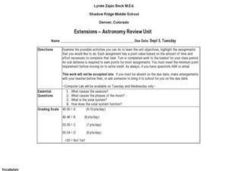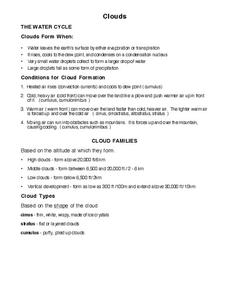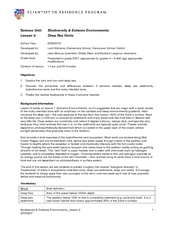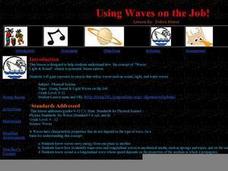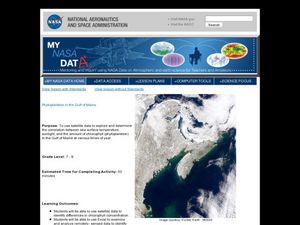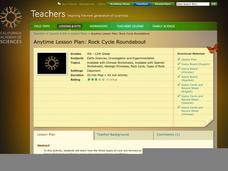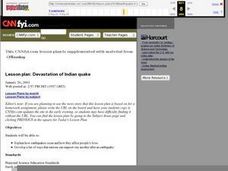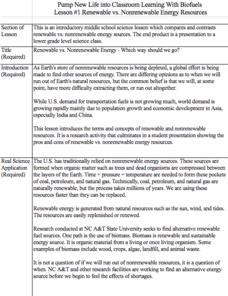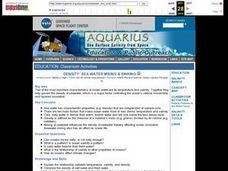Curated OER
Understanding Groundwater & the Effects of Pollution
Students complete a unit on the effects of pollution on our water supply. They create a graph to examine the density of earth's land surface, round the population to the nearest hundred million place, participate in a...
Curated OER
Keep It Cool
Students complete a science experiment to study insulation, heat transfer, and permafrost. In this permafrost study lesson, students design and test a soda insulator. Students graph their class data and discuss the results. Students...
Curated OER
Determining the Percolation Rate of Soil
Students discover how water moves through different types of soils. In groups, they use the same sample from a previous activity and empty it into a milk carton in which they have layered with cheesecloth to determine the percolation...
Curated OER
The Rain Maker
Second graders work in small groups with a cup each of several materials. Students layer the gravel, sand, and water into a resealable bag. They draw a picture of this bag in their water journal. Students place their sealed bags in a...
Curated OER
Extensions - Astronomy Review Unit
Students participate in a review unit in Astronomy using the Layered Curriculum. This allows them to take charge of the type of assessment that is given. The method also allows better differentiation of instruction to occur.
Curated OER
Clouds
In this science worksheet, students look for the meaning of the water cycle and its relation to the formation of clouds. They read the information about the different types of clouds.
Curated OER
Deep Sea Vents
Students study the vent and non vent deep sea and see the differences in habitats. In this investigative lesson plan students complete a worksheet and work in groups.
Curated OER
It's a bright and beautiful day...Protect Yourself!
Students investigate the cause and effect of skin cancer. They complete worksheets, view presentations and discuss the various types of ultraviolet rays and their impact on human health.
Curated OER
Trouble in the Troposphere
Pupils Use data sets from MY NASA DATA to produce graphs comparing monthly and yearly ozone averages of several U.S. cities. They analyze and evaluate the data and predict trends based on the data. In addition, they discuss and describe...
Curated OER
Layers of Time in the Earth
Students are introduced to the concept of stratification as a historical and geological process. Students will read about the Richard Beene archaeological site, which lies near San Antonio, Texas on the Medina River, and watch a short...
Curated OER
Physical Science: Dying for a Tan?
Students assess how much harm UV radiation can have on your skin and how much protection is provided by sunblock, sunglasses and clothing. They experiment with UV index numbers and the amount of exposure risk of skin damage for any given...
Curated OER
Are We Falling Apart? Exploding Volcanoes
Young scholars explore how volcanoes are formed, list the parts and characteristics of volcanoes, state the differences in various types of lava, and analyze the volume of ejecta from a volcano.
Curated OER
Earth & Space Science: Holding it Together
Students estimate how many drops of water can fit onto the surface of a penny and then test their hypothesis to find out. They also experiment with bubbles.
Curated OER
Greenhouse Effect: Pop Bottle Experiment
Young scholars explore global warming by conducting a weather experiment. In this greenhouse gas lesson, students define the greenhouse effect and the impact on our ozone layer. Young scholars utilize a soda pop bottle, floodlight bulb,...
Curated OER
Using Waves on the Job!
A colorful and comprehensive PowerPoint highlights this lesson on waves. Junior geophysicists pretend that they are hired to analyze seismic waves. A worksheet is provided to go along with an online article about how compact discs work...
Curated OER
Plotting Earthquakes
Students plot earthquakes on a map. In this lesson on earthquakes, students will explore recent earthquake activity in California and Nevada. Students will plot fault lines and earthquake occurrences on a map.
Curated OER
Phytoplankton in the Gulf of Maine
Students use satellite data to see the correlation between sea temperature and sunlight in the Gulf of Maine. In this phytoplankton lesson students use Excel to analyze data.
California Academy of Science
Rock Cycle Roundabout
After a basic introduction to the rock cycle and the three main types of rocks, young geologists can deepen their understanding of how rocks change through a fun learning game. Based on the characteristics and events shared by a reader,...
Curated OER
Liquid Rainbow
Students develop their own techniques for drawing a small sample of solutions into a straw. They hypothesize ways to increase the density of water, and discuss how salt-free rainwater tends to float on top of salty seawater.
Curated OER
Snack Tectonics
Yum! Using graham crackers, dried fruit sheets, and frosting, tectonics technicians demonstrate the different types of plate boundaries. If you want to encourage youngsters with an activity that is both educational and edible, then this...
Curated OER
Devastation of Indian Quake
Students read an online article at CNNfyi.com to determine what happened in India after an earthquake. They determine the magnitude of this earthquake and address the issue of relief efforts from other countries.
Curated OER
Teaching About Plate Tectonics and Faulting Using Foam Models
Young scientists learn about plate tectonics and the three different types of faults (normal, reverse, and strike-slip) using foam models. The activity also covers common types of locations where these faults are found.
Kenan Fellows
Renewable vs. Nonrenewable Energy Resources
Is one type of energy inherently good or bad? Young scientists explore energy resources in a week-long unit. After extensive research, groups create powerful position statements and presentations supporting their energy resource of choice.
Curated OER
Sea Water Mixing and Sinking
Middle schoolers investigate the role of temperature and salinity in determining seawater density. They use a Temperature-Salinity Diagram to examine the effects of mixing on density.






